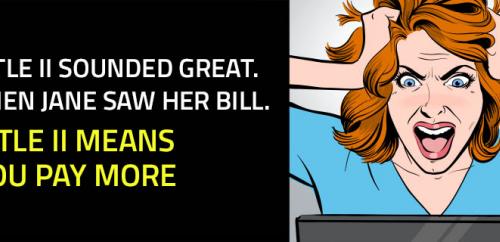One of the most immediate and significant consequences of reclassifying broadband as a Title II telecommunications service is that it provides a new opening for governments wanting to impose a variety of new taxes and fees on Internet services. In recent weeks NCTA has identified potential concerns about the impact of Universal Service Fund contributions and state and local taxes and fees that would result from reclassification.
A recent study from the Progressive Policy Institute confirms these concerns and suggests that the additional burden on broadband consumers could be as much as $15 billion annually. Title II unquestionably is worse for broadband consumers from a tax perspective. In fact, no party advocating for reclassification under Title II has argued that such a policy would not lead to any new taxes and fees on broadband. But some of these advocates, led by Free Press, have suggested that the magnitude of these changes is not significant and that the FCC can easily avoid these consequences altogether through a mix of forbearance and preemption and jurisdictional rulings. So as the debate bizarrely continues over whether Title II will cause consumers serious harm or mere moderate discomfort, perhaps we should ask: why do harm at all?
Perhaps it would help for Free Press to visit its own archives. When the question of imposing USF contribution requirements on broadband service (i.e., “a new broadband tax”) was separate from the question of open Internet regulations, Free Press consistently (and correctly) was opposed to such a policy:
“If the Commission decides to modify the current system of USF contributions, it should take special care to avoid stunting the growth in consumer adoption of broadband by placing a USF assessment on residential broadband connections.”
Letter from Free Press to the FCC (October 13, 2008)
“Because broadband is a developing market, any USF assessment, no matter how small, would likely result in a net decrease in total broadband subscribership nationwide.”
Dismantling Digital Deregulation: Toward a National Broadband Strategy (May 11, 2009)
Assessing the USF contribution requirement on broadband connections “would result in a net loss of nearly 2 million broadband subscribers.”
Letter from Free Press to the FCC (August 10, 2010)
“Our policymakers should think carefully before creating a new broadband tax. The big concern is that because consumer demand is more sensitive to price increases on emerging services like broadband than established ones like telephone service, a broadband tax could actually undermine adoption in low-income and senior populations, the very people most likely to be disconnected.”
Op-ed by S. Derek Turner, Research Director at Free Press (August 30, 2012)
While there are many divisive issues associated with broadband regulation, there should be universal agreement among regulators, ISPs, and advocates that our nation’s policies should strive to promote broadband adoption, not discourage it. And whether new fees show up as new USF line items, new taxes, or some other governmental charge, it’s broadband consumers that foot the bill. In its zeal to burden the Internet with Title II, even Free Press can’t run away from its previous advocacy that consumers have the most to lose.
